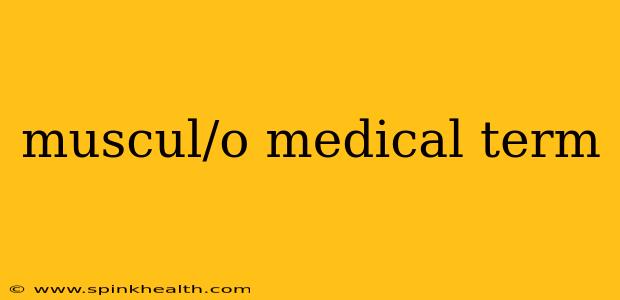Decoding the Medical Term "Muscul/o": A Journey into the Muscular System
Have you ever encountered the term "muscul/o" in a medical context and wondered what it means? This seemingly simple word fragment holds the key to understanding a vast and fascinating system within our bodies: the muscular system. Let's embark on a journey to unravel its meaning and explore related concepts.
This isn't just about memorizing a definition; it's about appreciating the intricate role muscles play in our daily lives, from the simplest movements to the most complex athletic feats. Understanding "muscul/o" unlocks a deeper understanding of health, fitness, and the remarkable human body.
What Does Muscul/o Mean?
The term "muscul/o" is a combining form in medical terminology. It's a prefix derived from the Latin word "musculus," meaning "little mouse." Ancient anatomists, observing the shape and movement of certain muscles, likened them to tiny mice scurrying beneath the skin. While the etymology might seem quaint, the term "muscul/o" remains a cornerstone of medical vocabulary, indicating anything related to muscle tissue or the muscular system.
What are Some Medical Terms Using "Muscul/o"?
Many medical terms incorporate "muscul/o" to specify a condition, procedure, or anatomical structure related to muscles. Understanding these terms helps in comprehending medical reports, conversations with healthcare professionals, and even in personal fitness goals. Let's explore a few examples:
-
Musculoskeletal: This widely used term combines "muscul/o" (muscle) and "skelet/o" (skeleton), referring to the system that encompasses muscles, bones, ligaments, tendons, and joints. It’s crucial in understanding movement, posture, and a broad spectrum of health conditions.
-
Muscular Dystrophy: This term encompasses a group of inherited diseases characterized by progressive weakness and degeneration of skeletal muscles. The "muscul/o" prefix clearly indicates the primary area affected.
-
Muscular Atrophy: This refers to the wasting or decrease in the size of muscle tissue. This can happen due to various factors, including lack of use (disuse atrophy), nerve damage, or certain diseases.
What are the Different Types of Muscles?
Understanding the types of muscles further enhances our grasp of "muscul/o's" significance. Our bodies contain three main types of muscles:
-
Skeletal Muscles: These are the muscles attached to our bones, enabling voluntary movement. Think of the biceps, triceps, and quadriceps – all falling under the umbrella of "muscul/o."
-
Smooth Muscles: Found in the walls of internal organs like the stomach and intestines, these muscles are responsible for involuntary movements like digestion and blood vessel constriction. While not directly named with "muscul/o," their function is still part of the broader muscular system.
-
Cardiac Muscle: This specialized muscle tissue forms the heart. Its rhythmic contractions drive the circulation of blood throughout the body.
How Does Understanding "Muscul/o" Help in Daily Life?
Understanding "muscul/o" and its related terms empowers you to:
-
Communicate effectively with healthcare professionals: You can better comprehend medical reports and engage in informed discussions about your health.
-
Make informed decisions about your fitness: Knowing the basics of muscular anatomy helps you tailor your workouts effectively, targeting specific muscle groups.
-
Recognize symptoms of muscle-related conditions: This allows for prompt attention and timely medical intervention if needed.
What are Common Muscle Injuries and Conditions?
Numerous conditions can affect muscles, ranging from minor strains to more serious injuries and diseases. Understanding "muscul/o" provides context for these conditions:
-
Muscle Strains: These are common injuries resulting from overstretching or tearing of muscle fibers.
-
Muscle Spasms: These involve involuntary muscle contractions that can be painful and debilitating.
-
Fibromyalgia: This chronic condition is characterized by widespread musculoskeletal pain accompanied by fatigue, sleep disturbances, and cognitive difficulties.
In conclusion, the seemingly simple medical term "muscul/o" serves as a gateway to a deep understanding of our bodies. It represents not just a word, but a complex system critical to movement, health, and overall well-being. By understanding this combining form, we gain a more comprehensive appreciation for the intricate workings of the human body.

